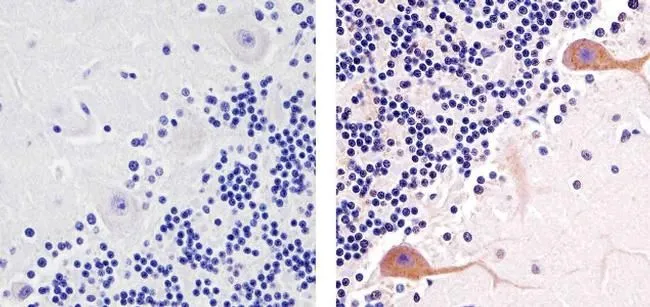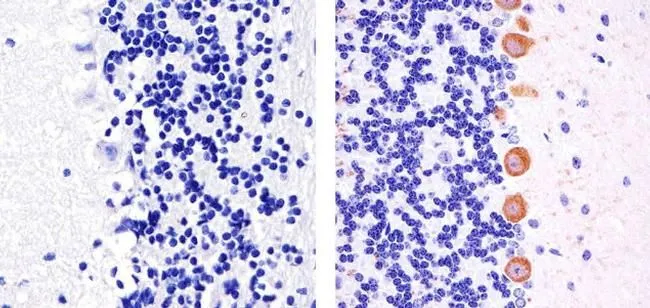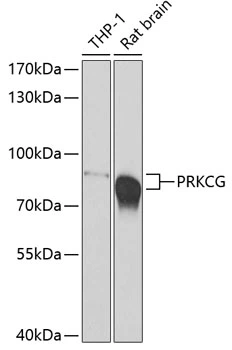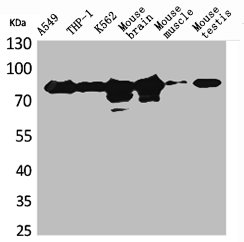
IHC-P analysis of human cerebellum tissue using GTX25797 PKC gamma (phospho Thr674) antibody. Right : Primary antibody Left : Negative control without primary antibody Antigen retrieval : 10 mM sodium citrate (pH 6.0), microwaved for 8-15 min Dilution : 1:20
PKC gamma (phospho Thr674) antibody
GTX25797
ApplicationsWestern Blot, ImmunoHistoChemistry, ImmunoHistoChemistry Paraffin
Product group Antibodies
ReactivityHuman, Mouse, Rat
TargetPRKCG
Overview
- SupplierGeneTex
- Product NamePKC gamma (phospho Thr674) antibody
- Delivery Days Customer9
- Application Supplier NoteIHC-P: 1:10-1:50. *Optimal dilutions/concentrations should be determined by the researcher.Not tested in other applications.
- ApplicationsWestern Blot, ImmunoHistoChemistry, ImmunoHistoChemistry Paraffin
- CertificationResearch Use Only
- ClonalityPolyclonal
- ConjugateUnconjugated
- Gene ID5582
- Target namePRKCG
- Target descriptionprotein kinase C gamma
- Target synonymsPKC-gamma, PKCC, PKCG, PKCI(3), PKCgamma, SCA14, protein kinase C gamma type
- HostRabbit
- IsotypeIgG
- Protein IDP05129
- Protein NameProtein kinase C gamma type
- Scientific DescriptionProtein kinase C (PKC) is a family of serine- and threonine-specific protein kinases that can be activated by calcium and second messenger diacylglycerol. PKC family members phosphorylate a wide variety of protein targets and are known to be involved in diverse cellular signaling pathways. PKC also serve as major receptors for phorbol esters, a class of tumor promoters. Each member of the PKC family has a specific expression profile and is believed to play distinct roles in cells. The protein encoded by this gene is one of the PKC family members. This protein kinase is expressed solely in the brain and spinal cord and its localization is restricted to neurons. It has been demonstrated that several neuronal functions, including long term potentiation (LTP) and long term depression (LTD), specifically require this kinase. Knockout studies in mice also suggest that this kinase may be involved in neuropathic pain development. Defects in this protein have been associated with neurodegenerative disorder spinocerebellar ataxia-14 (SCA14). Two transcript variants encoding different isoforms have been found for this gene. [provided by RefSeq, Oct 2015]
- ReactivityHuman, Mouse, Rat
- Storage Instruction-20°C or -80°C,2°C to 8°C
- UNSPSC12352203
References
- Zhang F, Fang Z, Wang JB. Hint1 knockout results in a compromised activation of protein kinase C gamma in the brain. Brain Res. 2015,1622:196-203. doi: 10.1016/j.brainres.2015.06.029Read this paper




